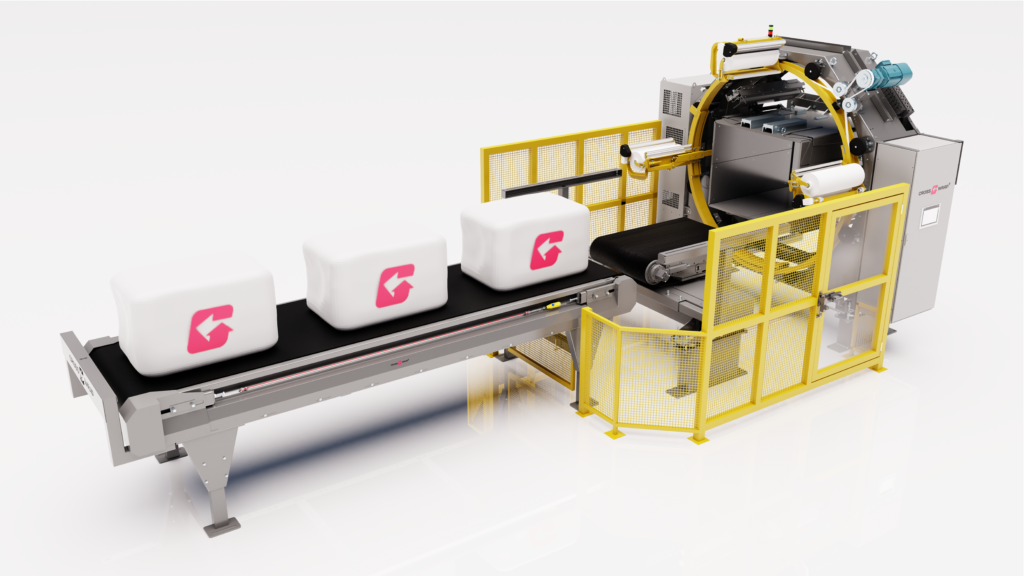Blog
Handling waste with POPs made easy with baling and wrapping
Handling waste with POPs made easy with baling and wrapping
What are POPs? Why is waste containing POPs facing increasing regulation? How can the waste be handled and managed correctly? In this blog, we answer all of the questions one may have about persistent organic pollutants, aka POPs.
POPs – what are they?
Persistent organic pollutants are organic chemicals that remain intact for long periods of time. This causes them to accumulate on organisms and on food chains and spread widely to the environment through air and water. Due to their toxic properties, POPs are hazardous to people and the environment.

POPs can be found in a variety of e-waste in addition to upholstered furnishings
There are various sources of POPs, including pesticides and industrial chemicals used in everyday products. POPs can especially be found in soft furnishings, domestic seatings, or electronic waste. Any upholstered furnishings, including sofas, armchairs, stools and futons can contain POPs, as can various e-waste, including office equipment, category 8 medical devices or category 10 automatic dispensers.
Persistent organic pollutants are organic chemicals that remain intact for long periods of time and are hazardous to people and the environment.
POPs waste disposal
The UK government has set in motion new regulations that require POPs waste to be treated in a way that doesn’t cause further harm by letting the chemical spread. But how can waste containing POPs be managed and disposed properly?
In the UK, the current required disposal method for waste containing POPs is disposable incineration or incineration with heat recovery. Due to the toxicity of POPs, landfilling the waste is no longer an option as of January 1st 2023. This means many waste collection service providers, waste-to-energy operators and other actors in waste management must be prepared to treat POPs waste accordingly.
In addition to a landfill ban, waste containing POPs must be sorted and stored in a way that prevents damage, cross-contamination with other waste, and the release of the chemicals. Collection, treatment and storage must be done carefully. If cross-contamination takes place, all waste is to be treated according to POPs regulations.
Bale and wrap POPs waste for secure storage and transportation

Whether you are using a channel baler or a twin-ram baler, our CW Bale Wrappers are a compatible solution!
How can you make sure you are transporting, handling, and storing waste containing POPs in a way that avoids spreading the chemicals?
We at Cross Wrap have almost three decades of experience in wrapping baled waste materials, including demanding, hazardous and industrial waste — applying our knowledge to help you handle POPs waste is no big deal! Our CW 2200 Bale Wrapper and the CW Direct Bale Wrapper are industry-leading solutions for wrapping waste materials in airtight, durable bales. Whether the baler you are using is a channel baler or a twin-ram baler, we have a solution ready for you.
We at Cross Wrap have almost three decades of experience in wrapping demanding baled waste materials, including both hazardous and industrial waste.
Transportation and handling waste containing POPs is safer when the waste is wrapped, as loose or unwrapped waste can cause problems. Durable crosswrapped bales ensure that the chemicals have no opportunity to spread to the surrounding environment, regardless of your transportation method.
Storing POPs waste in a way that no cross-contamination or chemical leakages can take place is essential in correct waste treatment and disposal. When your POPs bales await for incineration, wrapping them protects the surroundings and other non-contaminated waste material. Crosswrapped bales can be stored outside and even without a cover, as the bales are resilient against the elements.
If you want to learn more about our solutions for POPs waste handling, contact us at sales@crosswrap.com
